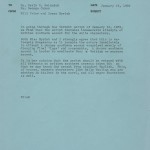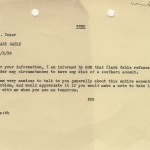Letters poured into producer David O. Selznick’s office on the proper use of Southern accents in Gone With The Wind. One woman wrote, “Come South and study our dialect. I don’t know your people as you do, but it cuts deep when we see our lovely old Southern life ‘hashed up.’”
Clark Gable employed a dialog coach, but two days before filming, Selznick learned that Gable was refusing to use an accent. Selznick then had Will Price, from the casting department, and Susan Myrick, a technical advisor, work on coaching the actors in the use of an appropriate accent.
Price and Myrick, in a memo to Selznick and director George Cukor, wrote, “we find that the script includes innumerable attempts at written southern accent for the white characters. Both Miss Myrick and I strongly agree that this is extremely dangerous as it prompts the actors immediately to attempt a phony southern accent comprised merely of dropping final ‘ings’ and consonants. A phony southern accent is harder to eradicate than a British or western accent.” They then advise that the script should be retyped, without the written southern accents.
Filming went on hiatus as Selznick replaced director George Cukor with Victor Fleming. Selznick wrote to studio manager Henry Ginsberg about his concerns over the accent during this period: “We know that Leslie Howard has made little or no attempts in the direction of accent and since he is on our payroll there is little excuse for this…. I am particularly worried about Vivien Leigh since she has been associating with English people and more likely than not has completely got away from what was gained up to the time we stopped.” Leigh was already under fire from the media and many Southerners for being British, so it would have been doubly ruinous for the film if she were unable to employ an accent.
Memos related to the actors’ accents are on view through January 4 in the Ransom Center’s current exhibition The Making of Gone With The Wind. A fully illustrated exhibition catalog of the same title is available. Co-published by the Harry Ransom Center and University of Texas Press, the catalog includes a foreword written by Turner Classic Movies (TCM) host and film historian Robert Osborne.
Please click thumbnails to view larger images.


